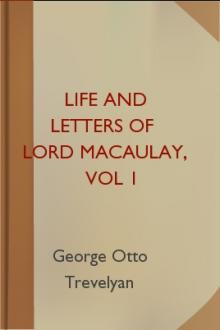Lady Audley’s Secret - M. E. Braddon (best pdf ebook reader for android TXT) 📗

- Author: M. E. Braddon
Book online «Lady Audley’s Secret - M. E. Braddon (best pdf ebook reader for android TXT) 📗». Author M. E. Braddon
The old man looked up for the first time, and wiped his wrinkled face upon a ragged silk handkerchief.
“I declare to you that I do not understand you,” he said. “I solemnly declare to you that I cannot understand; and I do not believe that George Talboys is dead.”
“I would give ten years of my own life if I could see him alive,” answered Robert, sadly. “I am sorry for you, Mr. Maldon—I am sorry for all of us.”
“I do not believe that my son-in-law is dead,” said the lieutenant; “I do not believe that the poor lad is dead.”
He endeavored in a feeble manner to show to Robert Audley that his wild outburst of anguish had been caused by his grief for the loss of George; but the pretense was miserably shallow.
Mrs. Plowson re-entered the room, leading little Georgey, whose face shone with that brilliant polish which yellow soap and friction can produce upon the human countenance.
“Dear heart alive!” exclaimed Mrs. Plowson, “what has the poor old gentleman been taking on about? We could hear him in the passage, sobbin’ awful.”
Little George crept up to his grandfather, and smoothed the wet and wrinkled face with his pudgy hand.
“Don’t cry, gran’pa,” he said, “don’t cry. You shall have my watch to be cleaned, and the kind jeweler shall lend you the money to pay the taxman while he cleans the watch—I don’t mind, gran’pa. Let’s go to the jeweler, the jeweler in High street, you know, with golden balls painted upon his door, to show that he comes from Lombar—Lombardshire,” said the boy, making a dash at the name. “Come, gran’pa.”
The little fellow took the jeweled toy from his bosom and made for the door, proud of being possessed of a talisman, which he had seen so often made useful.
“There are wolves at Southampton,” he said, with rather a triumphant nod to Robert Audley. “My gran’pa says when he takes my watch that he does it to keep the wolf from the door. Are there wolves where you live?”
The young barrister did not answer the child’s question, but stopped him as he was dragging his grandfather toward the door.
“Your grandpapa does not want the watch today, Georgey,” he said, gravely.
“Why is he sorry, then?” asked Georgey, naively; “when he wants the watch he is always sorry, and beats his poor forehead so”—the boy stopped to pantomime with his small fists—“and says that she—the pretty lady, I think he means—uses him very hard, and that he can’t keep the wolf from the door; and then I say, ‘Gran’pa, have the watch;’ and then he takes me in his arms, and says, ‘Oh, my blessed angel! how can I rob my blessed angel?’ and then he cries, but not like today—not loud, you know; only tears running down his poor cheeks, not so that you could hear him in the passage.”
Painful as the child’s prattle was to Robert Audley, it seemed a relief to the old man. He did not hear the boy’s talk, but walked two or three times up and down the little room and smoothed his rumpled hair and suffered his cravat to be arranged by Mrs. Plowson, who seemed very anxious to find out the cause of his agitation.
“Poor dear old gentleman,” she said, looking at Robert. “What has happened to upset him so?”
“His son-in-law is dead,” answered Mr. Audley, fixing his eyes upon Mrs. Plowson’s sympathetic face. “He died, within a year and a half after the death of Helen Talboys, who lies buried in Ventnor churchyard.”
The face into which he was looking changed very slightly, but the eyes that had been looking at him shifted away as he spoke, and Mrs. Plowson was obliged to moisten her white lips with her tongue before she answered him.
“Poor Mr. Talboys dead!” she said; “that is bad news indeed, sir.”
Little George looked wistfully up at his guardian’s face as this was said.
“Who’s dead?” he said. “George Talboys is my name. Who’s dead?”
“Another person whose name is Talboys, Georgey.”
“Poor person! Will he go to the pit-hole?”
The boy had that notion of death which is generally imparted to children by their wise elders, and which always leads the infant mind to the open grave and rarely carries it any higher.
“I should like to see him put in the pit-hole,” Georgey remarked, after a pause. He had attended several infant funerals in the neighborhood, and was considered valuable as a mourner on account of his interesting appearance. He had come, therefore, to look upon the ceremony of interment as a solemn festivity; in which cake and wine, and a carriage drive were the leading features.
“You have no objection to my taking Georgey away with me, Mr. Maldon?” asked Robert Audley.
The old man’s agitation had very much subsided by this time.





Comments (0)